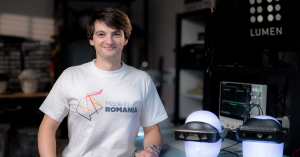With a growing pool of talented engineers and a supportive ecosystem, Central and Eastern Europe is poised for significant growth in the space industry during the next few decades, as regional startups are exploring new frontiers in satellite technology, space exploration, and other spacetech fields.
One of the key advantages of the CEE region is its proximity to established players in the European space industry, including the European Space Agency and major aerospace companies. This allows startups in the region to collaborate and partner with industry pioneers, gaining access to resources and expertise that would otherwise be difficult to obtain.
The development of the CEE space industry is also being driven by a supportive ecosystem, including government initiatives, accelerators, and incubators, and a growing community of space enthusiasts. All of these elements are helping to foster innovation and promote the growth of the industry in the region.
The European Space Agency plays a big part in the development of the sector throughout the region, with its Business Incubation Centres (ESA BICs) as the largest network of incubators supporting space related startups. The main goal is to support entrepreneurs with a space-based business idea and help them launch their products and companies.
For Macedonian entrepreneur and space enthusiast Dime Galapchev, we are already feeling the benefits of space technology, and this notion is only going to increase during the following years.
“In 2023 most people enjoy the benefits of the modern age totally ignorant of how much they have space technology to thank for that. Starting from the need to minimize computers in the early days of space travel, the GPS, to nowadays the best optic cables and artificial organs to be manufactured in Earth’s orbit. Knowing this I hope governments and the private sector in our region will wake up and start investing more as the space tech sector is the one that is going to expedite our progress because all humanity needs is a strong challenge and good engineers,” Galapchev tells The Recursive.
In this article we will highlight some of the CEE spacetech startups and companies that are leading the way in this rapidly growing industry. From companies developing advanced satellite technologies to those exploring new frontiers in space exploration, these startups are pushing the boundaries of what is possible and shaping the future of space.
Name: Amphinicy Technologies
Country: Croatia
What they do: Amphinicy Technologies is a provider of complex and technologically advanced software solutions for satellite machinery which help the satellites run in orbit and enhance their utility.
As the company outlines, its engineers have provided all-round support for satellite operators, equipment manufacturers, teleports, and multimedia and broadband service providers. “We consult our customers, collect the requirements, design the system and develop the tailored solutions,” the company says.
Amphinicy Technologies has been active for more than 20 years and operates in Luxembourg and in Croatia. Last year, the company signed a contract with the European Space Agency (ESA) for the project “Remote Agents for Cloud-Based Monitoring and Control”, based on its Monica product, a monitoring and control framework for the satellite industry.
The goal of the project is to adapt the Monica software suite to be used in cloud-based systems, which represent a novel architectural approach with one central monitoring and control instance that communicates with lightweight Remote Agents.
Name: EnduroSat
Country: Bulgaria
What they do: The spacetech Bulgarian company specializes in engineering, building, and operation of NanoSatеllites and offers shared satellite missions that provides nations, companies, and even universities access to space.
Through its Shared Satellite Service, EnduroSat also aims to provide entrepreneurs, scientists, and technologists easy access to space, helping them to drive innovation at this final frontier.
Founded in 2015, the company currently has a team of more than 80 people in Sofia and has proven to be fastest-growing space companies in Europe with an annual growth of 300% year to year.
At the end of 2020, EnduroSat joined forces with US-based space tech company Momentus for two service agreements: for the enclosure of Kuwait’s first spacecraft and satellite mission, and EnduroSat’s SPARTAN CubeSat in Momentus’s Vigoride orbit transfer vehicle for the SpaceX Falcon 9 launch.
Additionally, EnduroSat is also working with IBM to provide developers and students around the globe with a fast and easy way to process space data before getting it back to the ground.
Name: Sfera Technologies
Country: Bulgaria
What they do: Sofia-based Sfera Technologies has been established in 2019 as a spinoff of an aerospace engineering team, and its main product is called Homeport – a distributed ground station network for satellites.
Companies with satellites in orbit can use Homeport to find ground stations capable of obtaining data from the satellites based on price, data storage and processing options, and geographic availability.
Additionally, by using smart contracts and blockchain oracles, Homeport also allows space enterprises to quickly compose a virtual ground segment for its satellites, receive the data from them and fast-forward it to clients.
Sfera’s approach also aims to enable space infrastructures to scale efficiently and through a decentralized approach which differentiates the company from other actors in this field.
With a background in aerospace engineering, the company’s CEO Zdravko Dimitrov is also a co-founder of SAT-1, an initiative for bringing together talented people from Bulgaria in the field of engineering.
Name: Creotech
Country: Poland
What they do: Creotech designs, builds, and assembles space systems, with extensive experience in designing, manufacturing, testing and assembling flight models of spacecraft subsystems.
The Polish company has contributed to a various successful space missions, including commercial and research satellites in Low Earth Orbit (e.g. ICEYE-X2, OPS-SAT), scientific payloads aboard the International Space Station (ASIM, DESSIS), and a Martian orbiter (ExoMars Trace Gas Orbiter).
The company core team of over 230 specialists is supported by a strong research and development team, including additional engineers with an extensive background in complex electronics. Creotech also has production lines and AIT of microsatellites, and is working on a first 60 kg satellite IOD expected in the Q4 of 2023 and deliveries to Polish Ministry of Defence of a constellation in 2025.
They deliver their own solutions to the most modern and technologically advanced research institutions in the world, i.e. the European Space Agency, the European Organisation for Nuclear Research CERN in Geneva, the GSI Centre for Heavy Ion Research or the DESY Research Centre in Germany.
Last year, Creotech was a part of an international consortium led by the University of Innsbruck which was selected by the European Commission to build the first large quantum computer for the European Union. This international project aims to build a 100-qubit quantum computer by 2025 and achieve technological readiness to deliver a 1000-qubit solution by 2029. The Polish company is currently on the Warsaw stock exchange and has 25 systems or subsystems flying on large satellites.
Name: SatRevolution
Country: Poland
What they do: SatRevolution is a space tech startup that builds small and lightweight spacecraft. Founded in 2016, SatRevolution main focus is on building nanosatellites, with a team of twenty people, mainly engineers, with experience developing applications in harsh environments.
In April 2019, the company successfully carried Światowid, the first Polish commercial EO satellite in cubesat standard, into Low Earth Orbit, as the company’s technology demonstrator.
NASA has also listed SatRevolution as one of only 12 companies in the world that comprehensively design, manufacture, and place observational nanosatellites collecting optical data in orbits.
Currently, the Polish startup is implementing the next steps to build a functional, commercial constellation of 1,500 observation satellites (REC) by 2028. At the beginning of this year, SatRevolution also signed a contract with the country’s National Support Center for Agriculture (KOWR) for the development of the Satellite System for Monitoring Agricultural Crops.
Name: Spacemanic
Country: Slovakia
What they do: Bratislava-based Spacemanic is a small satellite mission integrator, focused on delivering innovative nanosatellite solutions, platforms, and components. The company is a spin-off company from the Slovak Organisation for Space Activities (SOSA), which has successfully designed, developed, launched and is operating skCUBE.
Spacemanic works in the field of design, development, and testing of fundamental small satellite components, such as onboard computers, power system units, and solar panels, with a team of experienced engineers in the fields of radio communication, and ground station design and operations.
The company has two labs equipped for space mission technology design and development, as well as a small testing facility for nanosatellite missions. One of Spacemanic’s main objectives is to bring innovations in the matter of rapid satellite development and cut the time from order to orbit delivery to several months.
Name: Digital Dryads
Country: Romania
What they do: Digital Dryads is a Romanian startup that monitors and alerts deforestation using the European Copernicus satellites that constantly observe the planet.
The company’s software monitors, analyzes, and alerts crops and forests by combining aerial and satellite data, while also detecting illegal logging in EU forests using state of the art satellite imagery (from Sentinel 2) and machine learning methods.
Founded in 2020 with headquarters in Bucharest, their technology also extends to detect canopy stress due to fungi, diseases, pests, or droughts and to do crop analysis at an unprecedented scale.
Digital Dryads also won first place in the 2020 edition of the EU Datathlon, an open data competition for startups and social enterprises.
Know any other spacetech startups from the CEE that would be a good fit for the list? Drop us a line at [email protected]








